Thank you for following today’s UK-focused coronavirus coverage. You can keep up with all the latest developments from around the world on our global liveblog.
Weekly round of applause for NHS staff – as it happened
Applause takes place after Dominic Raab leads meetings on Covid-19 physical distancing measures
Thu 16 Apr 2020 15.45 EDT
First published on Thu 16 Apr 2020 02.37 EDT- Evening summary
- Dominic Raab's press conference - Summary
- Raab says there may have to be a “transition” out of the lockdown
- Raab says economy would suffer if lockdown lifted too early
- Raab says lockdown will continue 'for at least next three weeks'
- Dominic Raab's press conference
- More than half of prisons have coronavirus
- Supplies of PPE for Birmingham council 'desperately low', ministers told
- UK hospital coronavirus deaths rise by another 861, taking total to 13,729
- 740 more people die in England
- MPs to be able to quiz ministers via Zoom
- Downing Street lobby briefing - Summary
- Price of high-demand food in UK rises sharply
- No 10 claims coronavirus crisis strengthens need for UK to be free of EU regulation after 2020
- Furloughed workers must get at least minimum wage, says GMB
- No 10 suggests some social distancing measures may remain in force for months
- Sturgeon announces 80 more deaths in Scotland
- Situation in UK "tempers positive signals" in Europe, says WHO
- Labour calls for more protection for armed forces
- Analysis: men twice as likely to die from coronavirus
- Returning to normal 'not likely in short term', says Hancock
- Majority of Britons think life will return to normal within six months, survey suggests
- Nearly half adults reporting high levels of anxiety, ONS coronavirus study finds
- Agenda for the day
- IMF boss calls for Brexit transition to be extended
- Some elements of lockdown will have to stay until vaccine available, health minister warns
- Hancock: we will not be distracted from lockdown message
- Government coronavirus advisor: some social distancing measures likely to be in place "indefinitely"
- Care bosses criticise government response to coronavirus in leaked letter
- UK lockdown likely to be extended

Live feed
- Evening summary
- Dominic Raab's press conference - Summary
- Raab says there may have to be a “transition” out of the lockdown
- Raab says economy would suffer if lockdown lifted too early
- Raab says lockdown will continue 'for at least next three weeks'
- Dominic Raab's press conference
- More than half of prisons have coronavirus
- Supplies of PPE for Birmingham council 'desperately low', ministers told
- UK hospital coronavirus deaths rise by another 861, taking total to 13,729
- 740 more people die in England
- MPs to be able to quiz ministers via Zoom
- Downing Street lobby briefing - Summary
- Price of high-demand food in UK rises sharply
- No 10 claims coronavirus crisis strengthens need for UK to be free of EU regulation after 2020
- Furloughed workers must get at least minimum wage, says GMB
- No 10 suggests some social distancing measures may remain in force for months
- Sturgeon announces 80 more deaths in Scotland
- Situation in UK "tempers positive signals" in Europe, says WHO
- Labour calls for more protection for armed forces
- Analysis: men twice as likely to die from coronavirus
- Returning to normal 'not likely in short term', says Hancock
- Majority of Britons think life will return to normal within six months, survey suggests
- Nearly half adults reporting high levels of anxiety, ONS coronavirus study finds
- Agenda for the day
- IMF boss calls for Brexit transition to be extended
- Some elements of lockdown will have to stay until vaccine available, health minister warns
- Hancock: we will not be distracted from lockdown message
- Government coronavirus advisor: some social distancing measures likely to be in place "indefinitely"
- Care bosses criticise government response to coronavirus in leaked letter
- UK lockdown likely to be extended



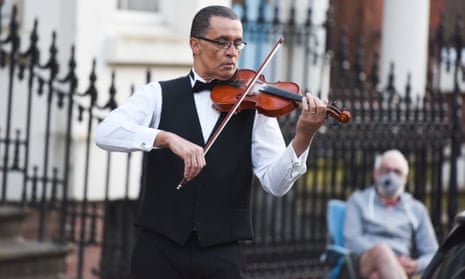
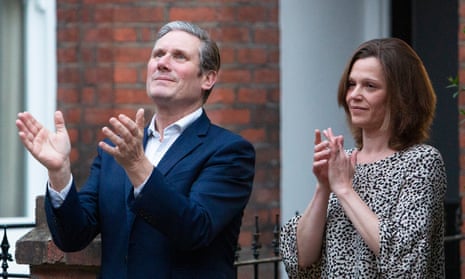
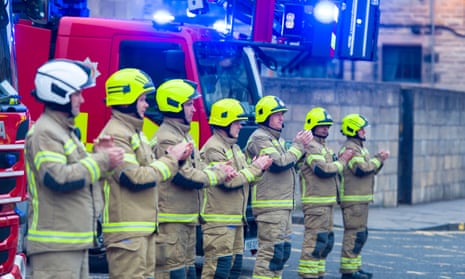

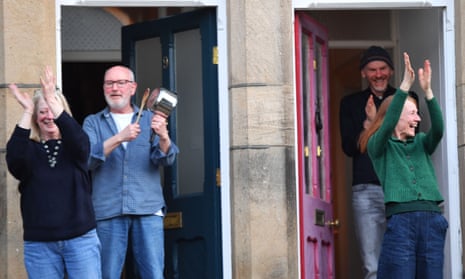

THANK YOU to all NHS staff, carers, key workers and #TransportHeroes 👏👏👏#ClapForNHS #ClapForCarers #ThankYouNHS #TransportHeroes #ThankYouThursday pic.twitter.com/A3RyF86KvW
— HM Government North (@HMGNorth) April 16, 2020
Tonight both control rooms @ASPolice come together to #ClapForCarers and thank #keyworkerHeroes & #OurNHS for the AMAZING work they continue to undertake every minute of every day. "Blue light to blue light" - THANK YOU for everything 💙 👏👏#InThisTogether #StayHomeStaySafe pic.twitter.com/eJddHL3tLb
— Avon and Somerset Police Control Room (@ASPControlRoom) April 16, 2020
Officers & staff from the Bolton division want to thank the NHS & all other front line staff including those behind the scenes for everything you are doing. #clapforourcarers #clapforNHS #clapforourkeyworkers #NHS #Bolton pic.twitter.com/Dg1OHNkioe
— GMP Bolton North (@GMPBoltonNorth) April 16, 2020
From our key workers to yours...
— hello we are #TeamCDDFT (@CDDFTNHS) April 16, 2020
We’d like to use this #clapforcarers to send our own applause to all other key workers and volunteers keeping us & our communities going – & to everyone staying at home – we’re all playing our part – thank you! #allinthistogether #staysafe pic.twitter.com/rPjHSVs2Ay
We're clapping right across the county for the NHS, carers and the key workers tonight - and to the brilliant people of Cheshire for staying home where they can. #ClapForTheNHS #ClapForCarers #ClapForKeyWorkers pic.twitter.com/msg1JPtIIZ
— Cheshire Police #StayHomeSaveLives (@cheshirepolice) April 16, 2020
NHS workers stand outside the Aintree university hospital during the 8pm clap to thank Capt Tom Moore, the 99-year-old war veteran who has raised more than £15m for the health service.

The UK’s weekly round of applause for NHS workers is to take place in less than five minutes.
Thank you to all our heroes for going to work every day to help keep us safe! We salute you! #clapforourcarers #staysafestayhome #covid19 #clapforkeyworkers #clapforcarers #stayhomesavelives #thankyouthursday #onemillionclaps pic.twitter.com/m2NjTjA2n9
— Clap for our Carers (@ClapforCarers) April 16, 2020
Evening summary

- Britain’s lockdown is to continue for at least another three weeks because experts still cannot be sure the coronavirus epidemic has peaked, Dominic Raab has said. The foreign secretary said there was hope that the number of new infections was no longer rising in the community daily but there was less certainty about some hospitals and care homes. You can see the full summary of this evening’s Downing Street press conference here.
- A further 861 people have died from coronavirus in UK hospitals, taking the running total to 13,729. Yesterday the daily figure was 761, but Prof Chris Whitty, the UK government’s chief medical adviser, said in the press conference yesterday afternoon that he expected today’s figure to be higher.
- The prime minister’s spokesman has insisted there will be no extension to the Brexit transition period, despite the coronavirus crisis. “We will not ask to extend the transition. And, if the EU asks, we will say no,” he told the daily briefing of lobby journalists. “Extending the transition would simply prolong the negotiations, prolong business uncertainty, and delay the moment of control of our borders.”
- The comments came after the International Monetary Fund (IMF) said the UK and EU should “not add to uncertainty” from coronavirus by refusing to extend the period to negotiate a post-Brexit trade deal.
- The UK was among a handful of countries singled out by the World Health Organization (WHO) for having “tempered” the “positive signals” that Europe is passing the peak of the Covid-19 outbreak. Dr Hans Kluge, WHO regional director for Europe, said the UK was one of the states to have “sustained or increased levels” of the virus.
- A slimmed-down “virtual House of Commons” featuring ministers in the chamber being questioned by MPs via video link is set to convene next week after Commons authorities agreed to the idea. The scheme, the first time part of the Commons will have sat remotely in its 700-year history, will allow up to 50 ministers and backbenchers to physically be in the chamber at any one time, with up to 120 appearing on screens.
- The GMB union has called on the government to make sure furloughed workers are paid at least minimum wage rates, saying the current rules are already causing “significant hardship”. The government’s current guidance states that furloughed workers can be paid the lower of 80% of their salary or £2,500 even if this would be below their appropriate minimum wage.
- Prof Neil Ferguson, the Imperial College epidemiologist whose coronavirus research influenced the government’s decision to introduce the lockdown, said that even when the measures starts to relax, “we will have to maintain some form of social distancing, a significant level of social distancing, probably indefinitely until we have a vaccine available”. It is thought that a vaccine could take 18 months to develop.
Dominic Raab, the foreign secretary and first secretary of state, represented the UK in a virtual summit of G7 leaders to discuss the coronavirus pandemic this afternoon. Here is Downing Street’s statement on the meeting:
All leaders expressed their best wishes for the Prime Minister’s recovery and welcomed the cooperation that has already taken place between G7 countries.
They agreed that the rapid development and production of coronavirus treatments and a vaccine will be crucial to stop the spread of the virus around the world. The First Secretary of State stressed the need for the response to be internationally coordinated.
Leaders discussed the particular risk coronavirus poses to developing nations and agreed on the need to fight coronavirus in every country. They committed to continue to support developing countries through bilateral assistance, multinational organisations and by ensuring governments around the world have access to the medical supplies they need.
G7 leaders also agreed on the importance of financial measures to defend the global economy against the impact of coronavirus. The First Secretary of State welcomed the efforts that have been made to coordinate economic responses, including agreements on debt relief earlier this week, and urged all countries to support long-term economic recovery.
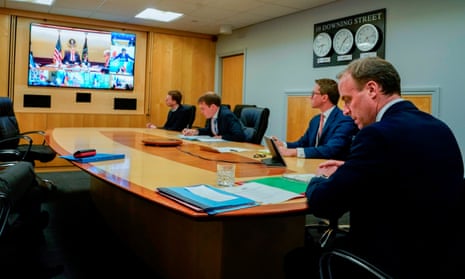
Dominic Raab's press conference - Summary

Here are the main points from the press conference.
- Dominic Raab, the foreign secretary and first secretary of state, confirmed that the coronavirus lockdown will continue for at least another three weeks. In his opening statement he said:
The advice from Sage [the scientific advisory group for emergencies] is that relaxing any of the measures currently in place would risk damage to both public health and our economy ...
Based on this advice, the government has determined that current measures must remain in place for at least the next three weeks.
He said the cabinet and Cobra, the government’s emergency committee, considered the advice from Sage earlier. Summarising what it concluded, he told journalists:
There are indications that the measures we have put in place have been successful in slowing down the spread of the virus.
But, Sage also say that it is a mixed and inconsistent picture and, in some settings, infections are still likely to be increasing.
Sage assess that the rate of infection, or the R value, is almost certainly below 1 in the community.
That means that on average each infected person is, in turn, infecting less than one other person
But, overall, we still don’t have the infection rate down as far as we need to.
As in other countries, we have issues with the virus spreading in some hospitals and care homes.
In sum, the very clear advice we have received is that any change to our social distancing measures now would risk a significant increase in the spread of the virus.
That would threaten a second peak of the virus, and substantially increase the number of deaths.
It would undo the progress made to date, and as a result, would require an even longer period of the more restrictive social distancing measures.
- Raab refused repeated invitations to speculate on how or when the lockdown measures might be relaxed, but he came close to confirming that they would be eased in stages when he said there might be a “transition”. He said:
We have been very clear that we will take the right decisions at the right moments based on the evidence. And they may well involve a transition out of the current measures. And, of course, they could be calibrated in different ways.
He also said that Boris Johnson’s claim on 19 March that the UK would be able to “turn the tide” in the fight against coronavirus within 12 weeks was still realistic. Raab said:
The prime minister said at the outset that it would take three months to come through the peak and I think that, broadly, is still the outline.
(Presumably, then, this would be another transition period that No 10 would hope to be over by the end of 2020.)
- Raab said five tests would be used to decide when it was safe to start relaxing the lockdown. He said:
First, we must protect the NHS’s ability to cope ...
Second, we need to see a sustained and consistent fall in the daily death rates from coronavirus so we are confident that we have moved beyond the peak.
Third, we need to have reliable data from Sage showing that the rate of infection is decreasing to manageable levels across the board.
Fourth, we need to be confident that the range of operational challenges, including testing capacity and PPE, are in hand, with supply able to meet future demand.
Fifth, and this is really crucial, we need to be confident that any adjustments to the current measures will not risk a second peak of infections that overwhelm the NHS.
- Raab said that lifting the lockdown now would harm the economy, not help it. At this stage there was no conflict between health and the economy, he argued. He said:
It’s not a trade-off here, if we get a second peak it’s not just damaging for people’s health and public safety, we will also end up back in a second lockdown which will prolong the economic risks.
Sir Patrick Vallance, the government’s chief scientific adviser, made the same point. He said:
At the moment this is not a tension between the economy and health, it’s very clear what we need to do now, which is to keep this down, stop this from coming back again, stop a second wave, which would need a second lockdown.
- Vallance said he agreed with Prof Neil Ferguson that a vaccine might provide the clearest exit strategy. (See 8.07am.) Asked about Ferguson’s comment, Vallance said:
I completely agree that the way out of this is vaccines and therapeutics [medicines]. Those are going to be critically important.
- Vallance suggested that there might be a need for people to carry on working from home for a prolonged period of time. He said:
There may be a number of measures that need to continue in order to allow [the virus] to be suppressed and controlled whilst vaccines and therapeutics come along ...
There will be some changes, I think, that will need to take place, that have already taken place, around things like home working, that are going to be important to maintain that ability to break transmission.
- Prof Chris Whitty, the government’s chief medical adviser, said that three other factors were more obviously risk factors for coronavirus than ethnicity. But the government did want to investigate further the extent to which BAME people seem to be more at risk, he said. He said over 90% of people who have died with coronavirus in the UK had at least one other disease, while other factors included being old and being male. He went on:
Being a member of an ethnic minority group is less clear [a risk factor], and I’ve had discussions with scientists about this in terms of trying to tease this apart today.
This is something we are very keen to get extremely clear. We’ve asked Public Health England to look at this in some detail and then what we really want is, if we see any signal at all, we want to then know what next we can do about it to minimise risk.
- Whitty said that the government hoped to have a “crude” idea as to what proportion of the public have had coronavirus soon, but that establishing a serology test (an antibody test) was complicated. (See 5.23pm.)
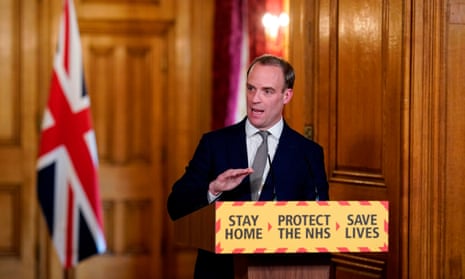
Nicola Sturgeon has asked that people continue to make “difficult sacrifices” and adhere to Covid-19 restrictions in order to save lives.
Speaking after the UK government’s Cobra meeting, Sturgeon said:
If we were to lift any of these measures now, we would risk an immediate and potentially exponential resurgence of the virus. And that could result in our NHS being quickly overwhelmed.
It could result in even more cases in our care homes, and it would also mean much more loss of life. It could of course also lead to the reintroduction of even more stringent restrictions in the future and substantially more damage to the economy.
As a result, in short, all of the progress we have achieved together in these last few weeks, through high compliance with the lockdown restrictions, would be lost.
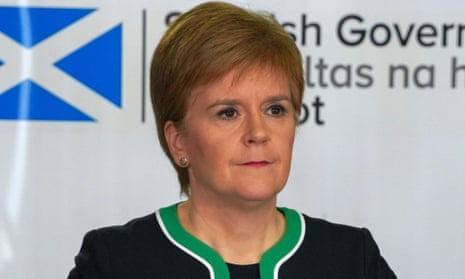
CBI director-general Carolyn Fairbairn has said businesses will support the extended lockdown because public health is the main priority.
At the same time, extending restrictions will bring serious challenges for many companies. The government’s lifelines for business will matter more than ever. In particular, it’s vital that the Job Retention Scheme starts delivering cash to struggling companies next week, as HMRC is working hard to achieve.
Firms also need urgent clarity on the scheme’s duration. When scientific evidence shows it’s safe to do so, eyes will turn to how the lockdown can be lifted. To build public trust and the right action, many voices will need to be heard, from health experts and political leaders to business, unions and local communities.
It’s not too early to start to plan, cautiously, and with public health paramount, for the revival of our economy.
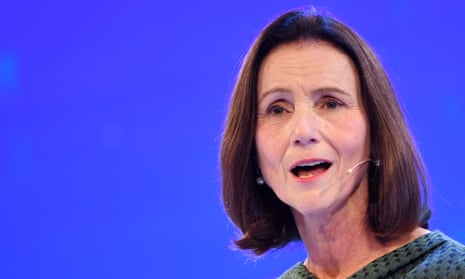

The Welsh first minister, Mark Drakeford, said the decision to continue the lockdown was agreed by all four UK nations.
I along with the first ministers of Scotland and Northern Ireland attended the UK government’s Cobra meeting. We each confirmed our decisions that the current restrictions on movement to protect the NHS and so to save lives should continue for another three weeks.
I know that the last three weeks have been very difficult for many people. I want to thank everyone in Wales for the way each of us is dealing with these challenging circumstances.
While we have seen some positive signs in the data, it is still too early to change course in dealing with this deadly virus. Many more lives are at stake, and too many families have already lost loved ones.
Nevertheless, the decision to extend the lockdown is not one that has been taken lightly. But I am clear that we cannot risk throwing away all the sacrifices we have made here in Wales over the last few weeks by lifting the restrictions too soon. That could mean more deaths and, in the long run, even greater impact on people’s jobs and livelihoods.
Comments (…)
Sign in or create your Guardian account to join the discussion